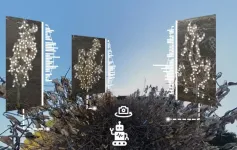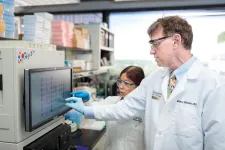We have probably all seen a soybean plant, about 1 meter high with leaves and pods compactly arranged on a main stem with a few short side branches. The wild relative of the domesticated soybean is a long vine with pods widely distributed on many side branches. Plant breeding by farmers thousands of years ago is to thank for this dramatic change.
As human population increases and protein demand doubles, modern plant breeders must further optimize soybean plant architecture and per plant yield for modern farming systems. Conventional techniques use imprecise visual scoring and laborious hand harvesting of single plants. Many important plant traits for modern farming systems are difficult to measure with current breeding tools, especially those related to complex physiological, structural, and environmental interactions. Attempts to accurately measure these traits often require advanced technologies or highly labor-intensive methods. Because of these challenges to future food production, UTokyo associate professor Wei Guo intends to “open a new era of artificial intelligence (AI) driven plant phenomics for these valuable but hard to access traits.
With this purpose in mind his lab teamed up with NARO soybean researcher Dr. Akito Kaga to design an image capture and AI analysis pipeline. Their technique enables much more precise and rapid measurement of single plant yield, plant architecture and seed localization with easily acquired in-field photographs or video. As Prof Wei Guo says “Most efficiency enhancing AI agricultural applications require costly aerial or robotic platforms, while our much lower cost system could be used by soybean breeders with very modest financial resources.”
UTokyo PhD candidate Tang Li developed a novel image analysis pipeline that can automatically process and estimate the number and spatial distribution of soybean seeds on a plant in the field. The deep learning image analysis pipeline, called Multi Scale Attention Network (MSAnet) uses a multi-scale attention mechanism to help count seeds. Li says “the most challenging aspect of designing MSANet was detecting only the foreground with minimal computation resources.” After focusing attention on the foreground and making seed distribution heatmaps, various tasks are conducted on upsampled images, then the images are downsampled, matched with neighboring images and a loss function is applied to increase estimate confidence. Finally, a kernel density algorithm is used to locate and count seeds, with more accurate results than any other existing pipeline. Then, easy to interpret graphs can be produced showing vertical seed distribution on individual plants that can be used by breeders to evaluate a variety of previously inaccessible traits on potential new varieties, or conduct genetic analysis on those novel traits.
Soybean breeders can use this new technique to directly select superior varieties for specific farming systems or for genetic analysis to identify the genetic regions of the soybean genome controlling vertical seed localization, plant architecture and height. According to Dr. Kaga, “MSANet will facilitate breeding for the lowest seed position, an important trait for modern machine harvesting that every breeder wants to quantify but which was previously not measurable in a high throughput pipeline”. Breeders can now rapidly identify potential new varieties with the ideal combination of traits. “I am pleased to see that the vertical seed distribution we proposed has been recognized by the breeding scientist Dr. Kaga, and I look forward to its application in real-world production,” said Li.
###
References
DOI
10.34133/plantphenomics.0260
Original Source URL
https://doi.org/10.34133/plantphenomics.0260
Funding information
This work was partially supported by Ministry of Agriculture, Forestry and Fisheries (MAFF) commissioned project study on “Smart breeding technologies to Accelerate the development of new genotypes toward achieving Strategy for Sustainable Food Systems, MIDORI”, Grant Number JPJ012037, by the Japan Science and Technology Agency (JST) AIP Acceleration Research, Grant Number JPMJCR21U3 and by the Graduate School of Agricultural and Life Sciences, University of Tokyo.
Journal
Plant Phenomics
END
UTokyo and NARO develop new vertical seed distribution trait for soybean breeding
2024-11-14
(Press-News.org)
ELSE PRESS RELEASES FROM THIS DATE:
Research into UK’s use of plastic packaging finds households ‘wishcycle’ rather than recycle – risking vast contamination
2024-11-14
Lancaster University researchers investigating consumer attitudes and behaviours around plastic food packaging have found UK households are ‘wishcycling’ rather than recycling – and say it’s a problem that everyone - government, food producers, waste management and residents – has to solve.
Wishcycling – the act of putting packaging in recycling bins and hoping for the best, rather than knowing it’s recyclable – is something households are doing due to confusing product labels and differing recycling facilities around the country, experts warn.
The academics behind Lancaster ...
Vaccine shows promise against aggressive breast cancer
2024-11-14
A small clinical trial shows promising results for patients with triple-negative breast cancer who received an investigational vaccine designed to prevent recurrence of tumors. Conducted at Washington University School of Medicine in St. Louis with a therapy designed by WashU Medicine researchers, the trial is the first to report results for this type of vaccine — known as a neoantigen DNA vaccine — for breast cancer patients.
The study, which found the vaccine to be well-tolerated and to stimulate ...
Adverse events affect over 1 in 3 surgery patients, US study finds
2024-11-14
Adverse events affect more than a third (38%) of adults undergoing surgery, finds a study of admissions to 11 hospitals in the US state of Massachusetts, published by The BMJ today.
Of the 1009 admissions analysed, nearly half were classified as major (resulting in serious, life threatening or fatal harm) and the majority were considered as potentially preventable.
Although this study may not fully represent hospitals at large, the findings show that “adverse events remain widespread in contemporary ...
Outsourcing adult social care has contributed to England’s care crisis, argue experts
2024-11-14
Outsourcing adult social care services in England to the private sector since the 1980s has led to worse care and should be rolled back, argue experts in The BMJ today.
Benjamin Goodair at the Blavatnik School of Government, University of Oxford and colleagues suggest that removing the profit motive would help improve quality and reduce inequities.
Social care, sometimes referred to as community, residential, or personalised care, for older people and people with physical and mental disabilities is facing record demand but performing worse than any time in recent history, they explain.
One contributor to this, they say, is the outsourcing of care provision from the ...
The Lancet: Over 800 million adults living with diabetes, more than half not receiving treatment, global study suggests
2024-11-14
**Correction**
A subheading in the press release sent yesterday was incorrect - the line 'Global rates of diabetes doubled over the last two decades' should be ''Global rates of diabetes doubled over the last three decades'.
The subheading and two further occurrences of the same mistake have been corrected in the copy below (in yellow). The rest of the press release remains unchanged.
We sincerely apologise for any inconvenience caused,
The Lancet press office (pressoffice@lancet.com).
The ...
New therapeutic approach for severe COVID-19: faster recovery and reduction in mortality
2024-11-14
A new clinical study shows that an inhibitor of Fas ligand (FasL), also called CD95 ligand (CD95L), led to a faster recovery of COVID-19 patients and reduced mortality. On average, it took eight days to recover for patients who received asunercept, a biotherapeutic FasL inhibitor, compared to 13 days in the control group. In addition, mortality was decreased by about 20 per cent. The study ‘Efficacy and safety of asunercept, a CD95L-selective inhibitor, in hospitalised patients with moderate-to-severe COVID-19: ASUNCTIS, a multicentre, randomised, open-label, controlled, phase 2 trial’ ...
Plugged wells and reduced injection lower induced earthquake rates in Oklahoma
2024-11-14
Wastewater injection resulting from oil and gas production in Oklahoma caused a dramatic rise in seismic activity in the state between 2009 and 2015. But regulatory efforts to backfill some injection wells with cement and reduce injection volumes have been effective in lowering the state’s induced earthquake rate, according to a new study in The Seismic Record.
The study by Robert Skoumal of the U.S. Geological Survey and colleagues lends further support to the idea that reducing the depth of wastewater injection can decrease seismic activity—a finding that ...
Yin selected as a 2024 American Society of Agronomy Fellow
2024-11-14
Frank Yin, agronomy researcher in the University of Tennessee Department of Plant Sciences, has been selected as a 2024 American Society of Agronomy (ASA) Fellow.
The honor was awarded as a result of Yin’s more than 35 years of research contributions to institutions across the world, including 16 years at the University of Tennessee Institute of Agriculture (UTIA). Yin was recognized for the Fellowship at the national meeting of ASA in San Antonio, Texas in November.
“I am humbled and honored to receive this distinction, but above all I am ...
Long Covid could cost the economy billions every year
2024-11-14
Working days lost to long Covid could be costing the economy billions of pounds every year as patients struggle to cope with symptoms and return to work, finds a new study led by UCL researchers.
The research, published in BMJ Open and funded by the National Institute for Health and Care Research (NIHR), examined the impact of long Covid on 4,087 patients who were referred to a long Covid clinic and registered in the Living With Covid Recovery (LWCR) programme between August 2020 and August 2022.
As part of their NHS treatment for the condition, the patients ...
Bluetooth technology unlocks urban animal secrets
2024-11-13
Mobile phones could be the key to a cheaper and more reliable way of tracking animals for ecology and conservation research, according to a new study from The Australian National University (ANU).
Traditional animal tracking methods are often expensive and require the tagged animals to be close to the tracking technology.
Now, ANU researchers have developed a cheap, lightweight Bluetooth beacon that can provide regular updates through our network of mobile phones in areas used by people carrying phones or smartwatches.
Study lead author and ANU ecologist, ...



